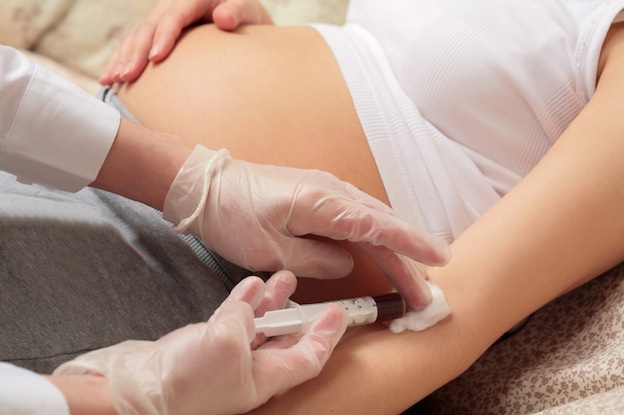SingaporeMotherhood | Pregnancy
January 2014
Pregnancy Tests & Scans
Throughout your pregnancy, you will have to go through a series of blood tests, ultrasounds and the like. This is all done to ensure the health of both mother and baby, as well as to screen for certain types of conditions – or the risk of them happening – in the baby. Some are compulsory, while others are optional.
[banner][/banner]
Blood Tests
There are some must-do tests, as required by the Ministry of Health.
Full Blood Count – this is the most common test taken during pregnancy and, although it looks at many components of your blood, it is mainly done to exclude anaemia and thalassaemia (a common genetic blood disorder in Singapore). It is usually done as part of your first pregnancy visit.
Other blood tests:
- Hepatitis B screen
- Rubella IgG screen
- VDRL (tests for syphilis)
- HIV
- ABO/Rh status (checks for your blood type as well as for the presence of antibodies)
Viability Scan
“A few scans are key during the first trimester,” says Dr Ann Tan, an obstetrician and gynaecologist in private practice. “A Viability Scan can be done at six to eight weeks gestation to confirm that the foetus is developing well and that there are foetal heart pulsations, indicating a viable pregnancy. Dating of the pregnancy at this time is also the most accurate, dating to within a few days to a week. This will ensure that the Expected Due Date (EDD) is calculated with the most certainty.”
First Trimester Pregnancy Screen/OSCAR
The College of Obstetricians and Gynaecologists recommends that all women be given the choice of screening their pregnancy for chromosomal abnormalities, in particular for Down Syndrome. This is done using the First Trimester Pregnancy Screen, which involves the Nuchal Scan and Serum BHCG and PAPP-A. The test takes about an hour and a half.
“The First Trimester Pregnancy Screening or OSCAR is offered as a means of universal screening for all pregnancies, whether the mother is younger or older, as all mothers carry a risk and the test gives the woman a chance to discover her individual risk for the current pregnancy,” explains Dr Tan. “The test involves a Nuchal Scan – a blood test for two hormones, namely serum free BHCG and serum PAPP-A – and is performed from 11 to 13 weeks gestation. The sensitivity of the test is approximately 90 per cent. The test costs approximately $320.”
Chorionic Villus Sampling
“For those who have a past history of an affected baby and wish to have a diagnostic test to exclude any recurrent chromosomal or genetic disorder, they can opt for a chorionic villus sampling at 11 to 12 weeks’ gestation,” says Dr Tan.
Chorionic Villus Sampling is done to detect chromosomal disorders and genetic diseases such as thalassaemia and Down Syndrome. In this procedure, your obstetrician will withdraw a small amount of the placental tissue by inserting a biopsy needle through your abdomen, into the placenta. Ultrasound is used to guide the needle so as not to harm your baby. The procedure takes only a few minutes and the tissue is then sent to the laboratory for tests. You’ll have to wait three or four weeks to get the results back from the laboratory. This test costs around $2,400.
Amniocentesis
This test, done between the 16th and 20th week of pregnancy, detects chromosomal disorders, the most common of which is Down Syndrome. Your obstetrician withdraws a small amount of the amniotic fluid surrounding the foetus by inserting a thin, hollow needle through your abdomen and into the uterus. Ultrasound is used to guide the needle. This procedure only takes a few minutes and the fluid is then sent to the laboratory for tests. You’ll get the results back in three to four weeks. This test costs around $1,500.
Free Foetal DNA test
“Those whose screening risk lie within the moderate risk zone (1:100 to 1:1000) should consider having a Free Foetal DNA (ffDNA) test, which is 99 per cent sensitive,” says Dr Tan. “This is a non-invasive test and only requires the mother to have another blood test.”
“However, diagnostic tests (whether with a Chorionic Villus Sampling or an Amniocentesis) should still be performed if one has a high risk reading for the child.”
The ffDNA test is used to determine how many abnormal certina chromosomes there are in the blood. It takes between 10 days and two weeks for results. There are no risks to the foetus as the tests are non-invasive. However, this test, at six to 10 times the cost of the earlier screening test, is costly.
In Singapore, Parkway Laboratories offers MaterniT21 PLUS™, a cutting-edge, non-invasive pre-natal test that allows expectant mothers to screen, with more than 98.6 per cent accuracy, the likelihood of their child having Down Syndrome, Edwards Syndrome, Patau Syndrome and sex-linked syndromes, all with just one blood test. Expectant mothers can choose to have the test from week 10 of their pregnancy up to the time of delivery, giving them an earlier and longer pre-natal screening window than conventional tests. MaterniT21 PLUS™ is available exclusively at ParkwayHealth Laboratory and costs $3,188.
Other Tests
Other blood tests should be done to screen for TORCHES or Toxoplasmosis and Cytomegalovirus. In addition to Rubella and Syphilis, a test for Herpes Simplex can also be taken if there is reason to believe that the mother has had exposure to it.
The following tests should be performed if there is sufficient history that suggests a medical problem or if the patient is exhibiting signs of the lack of it: iron levels, oral glucose tolerance test, thyroid function tests, uric acid and liver function.
“A detailed Foetal Anomaly Scan should be performed at twenty to 22 weeks gestation,” says Dr Tan. “Genetic screening is not the only issue, it also seeks out structural anomalies and common problems such as Diaphragmatic hernias and Congenital Heart Disease. At the same time as this scan, doppler blood flow studies as well as Cervical Length Assessments should be performed as these can help determine if the mother-to-be is at a higher risk of developing pre-eclampsia or preterm labour.”
All content from this article, including images, cannot be reproduced without credits or written permission from SingaporeMotherhood.
Follow us on Facebook, Instagram, and Telegram for the latest article and promotion updates.






